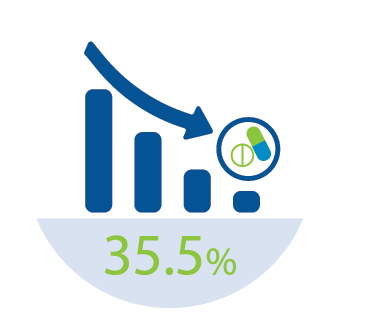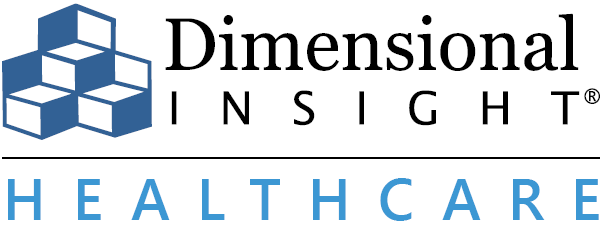Implementing the Right Analytics to Achieve HIMSS EMRAM Stage 7


Empowering Transformation
Revenue Boost Through Informed Decision-Making
The implementation of Dimensional Insight’s Analytics Solution results in a remarkable 48% year-over-year revenue increase for Huangshi Central Hospital’s gastrointestinal department, driven by enhanced access to critical data.
Precision in Antibiotic Usage Management
Dimensional Insight’s Analytics Solution facilitates better monitoring and calculation of antibiotic usage, leading to a substantial 35.5% reduction in the average antibiotic use strength and improved clinical quality measures.
Swift and Efficient Emergency Cardiac Care
The utilization of Dimensional Insight’s Analytics Solution, combined with a time-tracking application and RFID scanning, contributes to a 40.2% improvement in the time taken to unblock arteries for ST-elevated myocardial infarction patients, accompanied by a remarkable 67.4% reduction in mortality rate.
Transition to a Paperless Environment
Dimensional Insight’s Analytics Solution becomes an integral part of Huangshi Central Hospital’s initiative to go paperless, resulting in significant cost savings of over 1,000,000 Yuan RMB ($157,400 USD) in printing and paper expenses.
Comprehensive Data Integration Across Departments
Dimensional Insight’s Analytics Solution successfully integrates data from various administrative departments, including finance, HR, logistics, medical insurance, quality management, and DRG management, promoting holistic decision-making to enhance patient care and outcomes.
Key takeaways
Diver Platform provided the robust analytics and data governance Huangshi Central Hospital required to successfully achieve HIMSS EMRAM Stage 7 validation.
Huangshi Central Hospital improved the revenues of its gastrointestinal department by 48% year over year as a result of greater access to data.
By better monitoring and calculating antibiotic usage, the hospital reduced its average antibiotic use strength by 35.5%.
A time-tracking application using Diver and RFID scanning enabled the hospital to see a 40.2% improvement in the time that ST-elevated myocardial infarction patients had their arteries unblocked and a 67.4% reduction in mortality rate.

Diver Platform Provided The Robust Analytics And Data Governance Huangshi Central Hospital Required To Successfully Achieve HIMSS EMRAM Stage 7 Validation.
Background
Huangshi Central Hospital is part of the Edong Healthcare Group, one of the largest healthcare providers in Hubei Province, China. The institution is a tertiary comprehensive hospital with more than 50 clinical specialties over three campuses. Huangshi Central Hospital has more than 1,000 physicians who are dedicated to providing the best patient care to more than 1,090,000 outpatients, 55,000 emergency patients, and 70,000 inpatients.
The hospital is one of 14 Chinese hospitals validated at HIMSS EMRAM Stage 7. It has been accredited by the Joint Commission International (JCI) with 7 additional Clinical Care Program Certifications (CCPC), and has been awarded TÜV-SQS, Asia Ethics Certification, National Chest Pain Center, and National Stroke Center of China for the last three years.

Huangshi Central Hospital improved the revenues of its gastrointestinal department by 48% year over year as a result of greater access to data.
The challenge
Huangshi Central Hospital uses IT to support its strategic goals — including patient safety, staff efficiency, and management competency. However, the hospital recognized several challenges with its data:
- The hospital had data in disparate IT systems, and that data was not integrated.
- Most IT processes were documented on paper, resulting in missed closed loops and less effective management of IT operations.
- The hospital lacked effective data-driven governance and automated clinical decision support capacities.
Additionally, as technology use increased, staff and administrators throughout the hospital started to demand more IT resources to support paperless documentation, information security, and technology-enabled clinical closed loop processes such as medication administration, human milk management, and patient handover.
In 2015, the hospital introduced the HIMSS EMRAM validation process to help it address many of these challenges. After the hospital was successfully validated at Stage 6, it reassessed the needs of several hospital departments, and it determined that it needed a more robust analytics solution to support clinical, financial, and operational decision-making throughout the organization if it wanted to be validated successfully at Stage 7.

By better monitoring and calculating antibiotic usage, the hospital reduced its average antibiotic use strength by 35.5%.
“With Diver, we are able to analyze our data more easily and get results from the massive amounts of data at our hospital.”
The goal
Huangshi Central Hospital wanted to deploy analytics that would:
Integrate data from financing, HR, logistics, medical insurance, quality management, DRG management, and other administrative departments with clinical data. Improve clinical decision-making so as to improve patient care and outcomes.
Provide data to staff and administrators in various clinical areas to improve patient outcomes.
Promote a more data-driven culture around the entire hospital organization.
The Solution
Huangshi Central Hospital worked with Dimensional Insight China to implement Diver Platform across its organization. With Diver Platform, the hospital has successfully integrated its clinical, financial, and operational data from a variety of different sources.
“With Diver, we are able to analyze our data more easily and get results from the massive amounts of data at our hospital,” says Wantao Zhang, deputy director of the operations department at Huangshi Central Hospital. “When we have a core problem, we can now use our data to clearly understand it and make a plan to help solve it and improve patient outcomes.”
A time-tracking application using Diver and RFID scanning enabled the hospital to see a 40.2% improvement in the time that ST-elevated myocardial infarction patients had their arteries unblocked and a 67.4% reduction in mortality rate.
“Diver has fundamentally changed the way we run our hospital.”
The results
Diver is part of Huangshi Central Hospital’s overall effort to go paperless across the organization. As a result of that initiative, the hospital has saved more than 1,000,000 Yuan RMB ($157,400 USD) in printing and paper costs.
In addition, Huangshi Central Hospital is using Diver in several areas:
Improving Gastrointestinal Department Revenues
Huangshi Central Hospital wanted its gastrointestinal (GI) department to improve its revenue as its annual priority measure. With Diver, the department was able to drill down to identify the root cause of a reduction in revenues: reduced specialty treatments and surgery. As a result, the department was able to determine that under-staffing and an increase in demand for sedated procedures were causing this reduction in services. Two months after solutions were put into place, the department had revenues that were 20.3% higher than the same period a year earlier. Four months after the improvements, revenues grew 72.6% for a 68.8% increase over the same time period a year earlier. After the hospital had seen revenue improvements for six months, the hospital completed the project with service revenues that were 48% higher compared to the same period a year before.
Reducing Antibiotic Usage
One of Huangshi Central Hospital’s clinical quality measures is strength of antibiotic use. Like hospitals around the world, Huangshi Central Hospital would like to cut down on unnecessary use of antibiotics given concerns about the rise of antibiotic-resistant “super strains” of bacteria. Diver was able to monitor this measure for the hospital and calculate the defined daily dose (DDD) for each patient. Diver presented this data in a dashboard; it also allowed the hospital to view individual physician prescription habits.
As a result of this initiative, Huangshi Central Hospital was able to reduce its average antibiotic use strength from 65DDDs to 41.93DDDs, a 35.5% reduction. For hip replacement surgeries, the average DDD went from 102.3 to 10.21, a 90.1% improvement. In addition, prior to this initiative, more than 10 departments had an average strength of more than 100DDDs; after the initiative, only 4 departments were still over the 100DDD mark.
Reducing Myocardial Infarction Mortality Rate
Door-to-balloon (D2B) time is an important metric in emergency cardiac care, specifically for ST-elevated myocardial infarctions.
This metric measures the time from when a patient enters the emergency department to the time a blocked artery is opened in the cath lab. Huangshi Central hospital targeted a D2B time of less than 90 minutes. With Diver, the hospital developed a time-tracking system enabled by RFID scanning to monitor the D2B process. It monitored seven steps along the way and aimed to improve and more tightly control each step. As a result, Huangshi Central Hospital reduced the D2B time from 95.63 minutes to 57.19 minutes, a 40.2% improvement. In addition, the mortality rate decreased from 10.9% to 3.55%, a 67.4% reduction.
Overall, Diver has helped contribute to a more data-driven culture within Huangshi Central Hospital. The organization reports that clinical department directors and unit head nurses check their dashboards first thing in the morning to decide the day’s priorities and staff schedules. They turn to the Diver dashboard to drill down on problems, devise solutions, and use trends to assess outcomes.
“Diver has fundamentally changed the way we run our hospital,” says Zhang.
What’s next
Huangshi Central Hospital’s future projects are centered around reducing the cost of patient care while still achieving improved outcomes. Diver is critical to those efforts.
In addition, the hospital is planning to upgrade its Diver implementation to Diver Platform 7.0 in order to take advantage of columnar databases and the increased speed and performance that brings.
Lessons learned
Overall, Diver was an important piece in bringing Huangshi Central Hospital to HIMSS EMRAM Stage 7 validation. The hospital learned that greater availability and practicality of data would allow its staff and administrators to improve their decision-making and lead to improved outcomes.
When leaders at all levels of the organization are able to “speak with data” at a greater frequency, that’s when the staff’s acceptance and compliance with data-driven improvements begins to rise, thereby leading to improved safety, quality, and efficiency throughout the organization.
Download case study
Huangshi Central Hospital
Organization
Huangshi Central Hospital
Industry
Healthcare
Location
Huangshi, Hubei Province, China
Beds
1,980
Employees
1,000 physicians
Customer since
2017
Solution
Diver Platform
